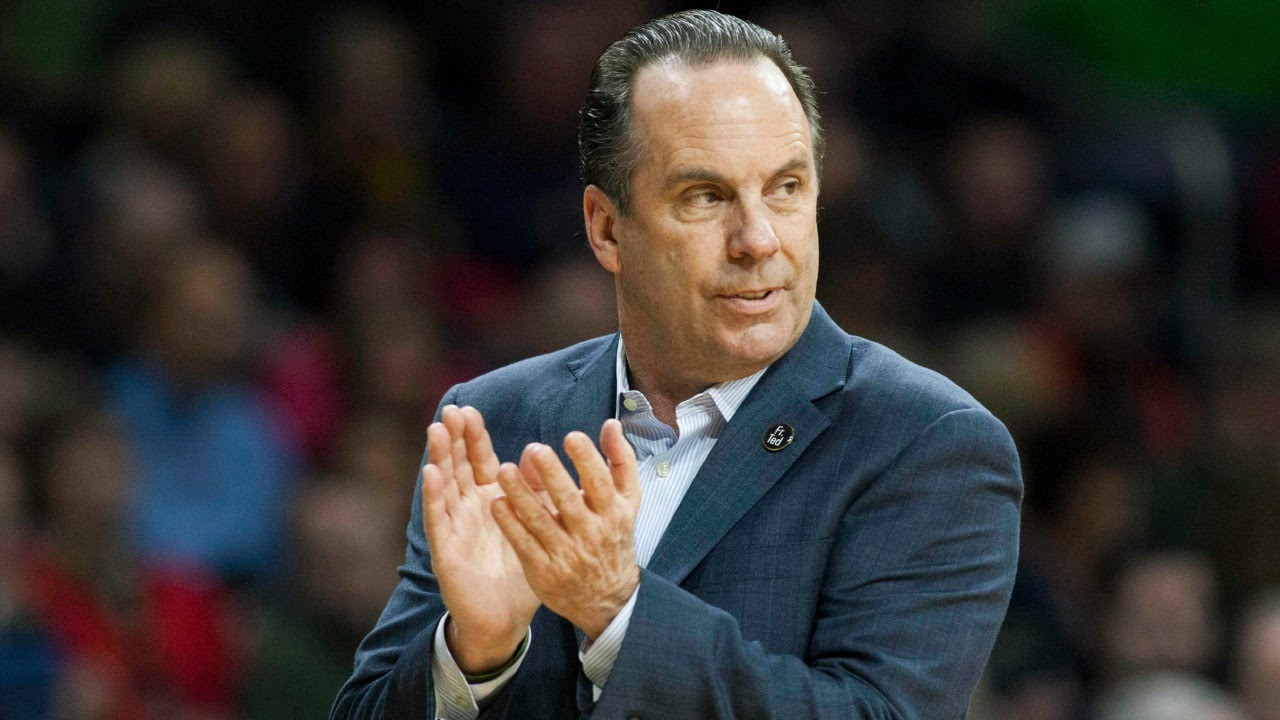
Don’t look now, but Mike Brey’s Notre Dame basketball team sits atop what may be the best conference in college basketball.
Nobody should be surprised by this.
It’s the sort of thing the former DeMatha point guard/assistant coach has been doing for a decade and half, ever since he took over the basketball fortunes of the Irish.
Yet somehow – perhaps because of the school’s geographic isolation from its rivals in the Big East and now the Atlantic Coast Conference – Brey’s accomplishments seem to be perpetually overlooked.
Oh, writers and broadcasters all over the country go on and on about Notre Dame football – even though the Irish have been mostly irrelevant nationally in recent years. But Brey’s record at Notre Dame (back-to-back Elite Eight appearances, a dozen 20-win seasons in 16 years at South Bend) hasn’t drawn similar attention.
He doesn’t have the name recognition of ACC rivals like Rick Pitino, Jim Boeheim or Roy Williams. Yet he’s competed on virtually even terms with all of them since the program joined the Atlantic Coast Conference.
Brey’s Irish are at it again this year. Notre Dame is ranked 15th in the latest Associated Press poll, they’re 16-2 overall, 5-0 in the ultra-competitive ACC – and atop the league standings. Their only two losses came against top-ranked Villanova (by eight points) and No. 21 Purdue (by five points). Notre Dame has already beaten No. 12 Louisville and owns three road victories in league play (Pitt, Miami and Va. Tech).
Now in his 22nd season as a head coach, Brey has won a little more than two-thirds of his games. In his first five seasons at the University of Delaware he turned that program into a winner before reviving the fortunes of Notre Dame basketball, which had fallen off drastically during the 1990s.
Between 1990-91 (Digger Phelps’ last season as coach) and 1999-00 (Matt Doherty’s lone season), the Irish were a mediocre 140-159. During that time, they made just three postseason appearances, all in the NIT. Brey took over the program in 2000-2001 and won 64 games in his first three years, taking the Irish to the NCAA Tournament three straight times.
Through the years, he kept right on winning. Brey recently coached his 700th college basketball game and he’s getting close to some pretty significant milestones. With 29 more victories (probably sometime next year), he’ll win his 500th game as a college coach. At about the same time (with 22 more victories) he’ll surpass Phelps as the all-time winningest coach in Notre Dame basketball history.
Brey grew up in the Bethesda-Rockville area and probably would have attended Walter Johnson or the now-closed Woodward High School had he not chosen DeMatha. Back in the mid-1970s, kids weren’t commuting all over the area to attend private school to play basketball, the way they do now.
But he wound up playing for legendary coach Morgan Wootten and the Stags. He then moved on to play at Northwestern State (Louisiana) for three years before finishing up as a player at George Washington.
That’s when he moved into coaching. He served as one of Wootten’s assistants during the mid-1980s and joined Mke Krzyzewski’s staff at Duke in 1988, where he stayed long enough to help the Blue Devils win back-to-back NCAA titles in the early 1990s.
When Brey finally went off on his own, it was to take the job at the University of Delaware. Brey did a great job there, going 99-51 with a couple of America East championships and a pair of trips to the NCAA Tournament.
The wonder is that it took five years before a major-college program snapped him up. Here, after all, was a man who learned at the right hand of two of the most respected head coaches in the game. Given his resume, it seems like some Power 5 conference athletic director would have taken a chance on him sooner.
In any case, Brey showed what he could do by making the Blue Hens a big winner. His work there (including three 20-win seasons in five years) ultimately landed him in South Bend. There, he has continued to do what he did at Delaware and what some who preceded him at Notre Dame failed to do – win.